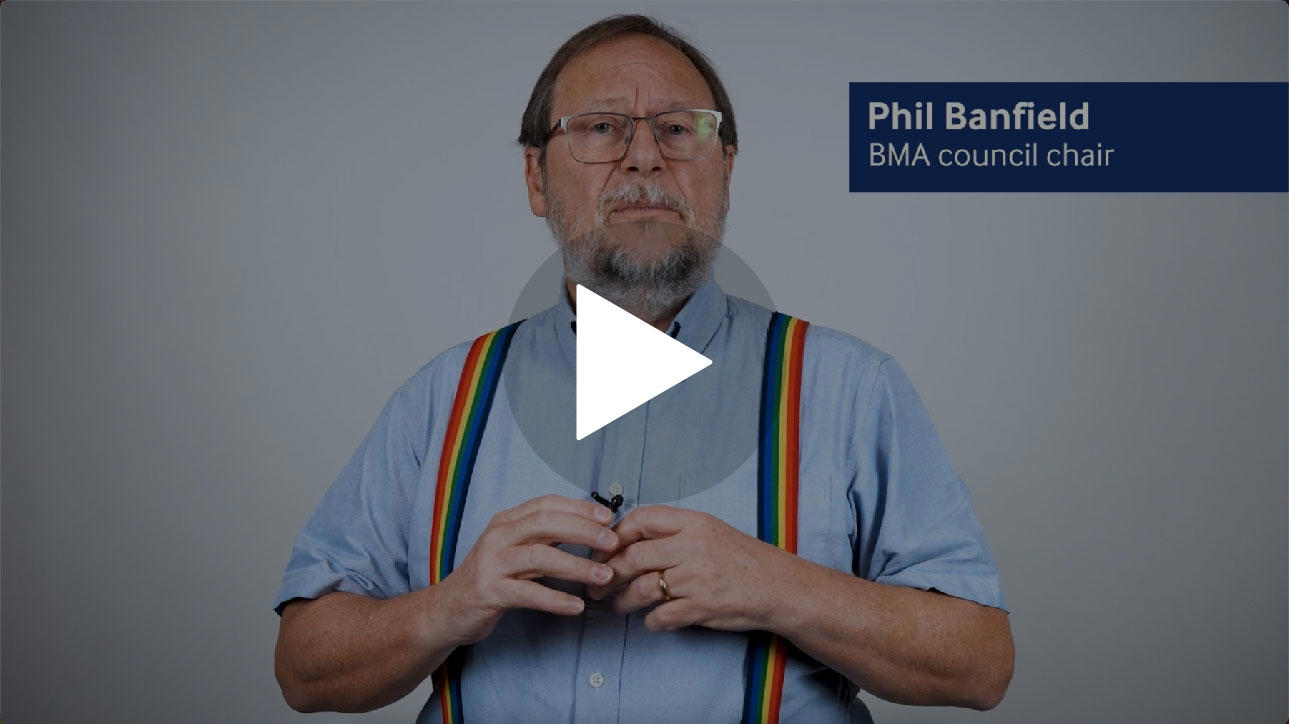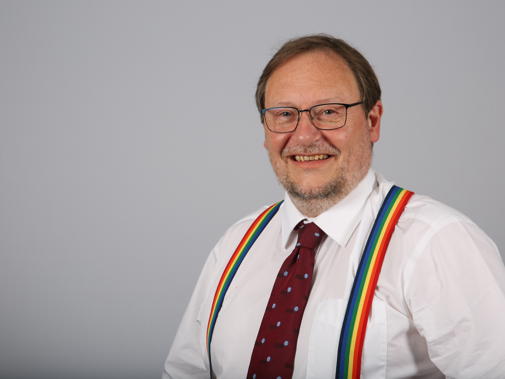Watch a New Year message from BMA Chair of Council Phil Banfield

In the last year your BMA has grown from strength-to-strength. Collaboration between elected representatives, activists and members has put over a billion pounds back in doctors’ pockets across all 4 nations of the UK. This level of organising has been transformational – together we have found our collective voice and our combined strength – leading to the highest levels of membership we have ever seen before. You are one of 195,000 doctors standing together, working together and winning together.
Restoring doctors’ pay and empowering you locally are priorities for 2025
We must embed this change throughout our association and across the medical profession because with higher and higher levels of membership we are even more effective when bargaining, improving outcomes on pay, student finance, pensions, and terms and conditions. Never again can we allow important wins to be eroded. This is why, as we enter 2025, we continue the journey towards full pay restoration and pushing ahead with training more and more BMA representatives to empower doctors in the workplace.
The BMA is also leveraging the strength of its members locally. So far, members have successfully prevented disreputable Trusts slashing overtime rates despite growing waiting lists. On the Isle of Man, we’re backing doctors in their fight for pay restoration too, with a huge 95% voting for industrial action, giving us a massive mandate for local strike action unless a credible offer is made.
GPs in England remain locked in dispute with the UK Government to reverse the unabetted crisis in general practice; a crisis amplified by the scandal of GP unemployment when the country needs them most; a crisis caused by a refusal to fund General Practice costs fairly. Only if GPs stick together and work together can we arrest this decline and restore general practice as the cornerstone of the NHS. Contract negotiations in all 4 nations continue in 2025, but it will be doctors, not the governments, who determine if the offer is good enough.
We continue to oppose the unsafe expansion of medical associate roles and doctor substitution
In 2024 we didn’t just win industrial disputes but have led, together with thousands of doctors, a stand against dangerous plans to expand medical associate roles. The pantomime that has been playing out over physician’s associates has been anything but funny, with tragic consequences sadly for patients. The debate has been characterised by doublespeak, the trivialising of safety concerns and a refusal to take seriously the views of doctors and patients.
Earlier this year we ended the pass-the-parcel game played by the NHS, the GMC and royal colleges over scope of practice, publishing the first national, cross-specialty standards which clearly define the limits and supervision of these roles. While many now agree a national scope is necessary, it is the BMA that filled the void. While the new Government has finally listened and announced an independent review of these roles, chaired by Professor Gill Leng, NHS England refuses to implement concrete interim safety measures despite even the Secretary of State sharing our concerns. You do not fly a plane under safety review – you ground it. When other organisations have given up on maintaining patient safety, the BMA has and will not. As we move forward, we will continue to demand that the NHS prioritises the safety of patients by whatever means necessary.
We challenge the GMC, a cavalier regulator that has lost the confidence of the medical profession
At our Annual Representatives Meeting in June I announced that the BMA was taking the GMC to court over their role in perpetuating confusion in the MAPs debacle. Since then, we have also agreed to back the Anaesthetists’ United Judicial Review too.
However, doctors’ concerns about the GMC are far wider than their staggering approach to this scandal. Whether that is launching Fitness to Practice proceedings against doctors peacefully protesting the climate emergency, or what was the incredulous suspension of a doctor over whether they were promised a laptop, i t’s clear to us that the GMC has become an unaccountable regulator intent to ride roughshod over the lives and careers of doctors. As doctors, YOU have told us you have no confidence in the GMC; as an organisation, we will do all we can to seek root-and-branch reform.
The UK COVID-19 Inquiry continues to expose tragic failings in planning and logistics, but heroic truths about doctors’ dedication and expertise
This year we have seen startling attempts by politicians to evade responsibility for their decisions during the pandemic. By being a core participant, the BMA is able to better scrutinise what went wrong and argue for the action needed so that staff are better protected now and in the future. We believe that there was, and is, inadequate protection from this airborne virus, that staff today still bear the pain of the pandemic, experiencing long covid, trauma, stress and burnout. The state of the health service going into the pandemic played a clear and obvious role in the inability to cope when COVID-19 hit the UK’s shores.
The inquiry must make clear and actionable recommendations that we must hold the Government accountable to deliver. We need justice for those let down by failures to protect patients and the staff caring for them; a step in the right direction would be to recognise that COVID is an occupational disease for many, with life changing effects that merit appropriate compensation. It has highlighted the role that frontline public health colleagues could and would have played if they had not been disconnected from the NHS after the 2012 HSCA, starved of funding and public health doctors. Never has the need to reverse the declines in public health, occupational health and academic medicine been so evident.
The BMA is its members – you have asked us to continue transforming YOUR association and trade union in 2025
The fundamental shift in the BMA is from a service organisation to an effective organising and campaigning one, exerting collective power to improve the lives and working conditions of medical students and doctors across the UK - whether that is addressing training bottlenecks for resident doctors when there is a paradoxical shortage of GPs and consultants, or fighting for better recognition and valuing of Specialist, Associate Specialist and Specialty doctors who bring great expertise and experience across the NHS. Locally employed doctors in particular need appropriate national contracts to give employment protections and avoid abuse in the workplace. But bullying remains an issue, and many are treated neither fairly nor equitably. This needs the whole medical profession to address; there is no place for microaggressions, bullying or discrimination in our teams.
The next generation of doctors will see 2025 as a pivotal moment for the medical profession
The medical profession is under siege for its identity and future. This is exemplified by the GMC’s use of the phrase ‘medical professional’ to include MAPs (which forms the basis of our legal challenge) and the unfettered expansion of PA role and scope of practice. It is for the current generation of doctors to train and inspire the next, yet there is a sense that it is our, and past generations’ failure to act that has led to highest student debt ever and lowest uptake of entry into further training. We will be judged on how we respond to the crisis of the future of doctors in the UK that has unfolded in front of us. I’m not going to dwell on what others may or should have done in the past to prevent this situation, but focus on what we can and will do, together, to get the unique knowledge, skills and expertise you have taken so long and worked so hard to acquire recognised and remunerated fairly.
We will work to represent more doctors in more places
Doctors work increasingly outside conventional NHS employment, within private companies, private sector providers, local authorities and independent practice. Our armed forces are well-established within the BMA. Each area has common but often unique issues, so we continue to press for trade union recognition wherever doctors work, including the academic, governmental, commercial and university sectors. Also, the lines are increasingly blurred between those paying into pension schemes and those working and drawing some or all of their benefits; retired members are often still in work.
This hugely complex employment environment may have very different needs across a 50-year BMA membership; but your value is as equal and important on day one of medical school as it is on day 18262. We are one medical profession. We train and gain unique skills and expertise. We are doctors.
With another busy year ahead, all that is left is for me to wish you a very happy New Year. Once again, let's make 2025 another year where doctors make the difference.

